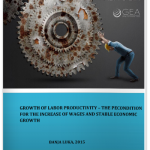
On Wednesday, November 27, the research on labor migrations between B&H and Austria was presented at the Vienna Institute for International Economic Studies – wiiw.

Research paper “Taxation of Wages and the Informal Economy” made by Center for Research and Studies GEA in cooperation with Union of Employers’ Associations of RS, funded by International Labor Organization (ILO), was presented at this event.

Center for Research and Studies GEA completed an analysis “Growth of labor productivity – the precondition for the increase of wages and stable economic development”.

The growth of labor productivity is the primary economic objective that enables strengthening of competitiveness of the domestic economy and stable development.

Report “Creating a more favorable business environment for decreasing informal (grey) economy in the Republic of Srpska” reveals what employers in the Republic of Srpska see as main causes of grey economy and where we stand on these matters in comparison with Serbia, Croatia, Macedonia and Austria.

Report “Creating a more favorable business environment for decreasing informal (grey) economy in the Republic of Srpska” reveals what employers in the Republic of Srpska see as main causes of grey economy and where we stand on these matters in comparison with Serbia, Croatia, Macedonia and Austria.

It is well-known that B&H’s 40% “tax wedge” – the amount of taxes and contributions on income – is relatively high when compared with that many countries. This means that for every 100 BAM that an employer pays for one registered worker, only 60 BAM goes to the worker.

The announcement by the Government of the Republic of Srpska to introduce a 200 BAM tax-exempt portion of wages is surely a welcome measure. This tax exemption is clearly insufficient, however, when we consider policies being adopted by neighboring and EU countries in their attempts to tackle the dire state of the labor market and … Continue reading How to achieve lower labor taxation without harming public funds?

The key findings of a study analyzing the current higher education funding system in Bosnia and Herzegovina point to the fact that higher education system in B&H is, besides being complex, financially ineffective. Labor market demands urgent change of the enrollment policy and higher education funding system in B&H.